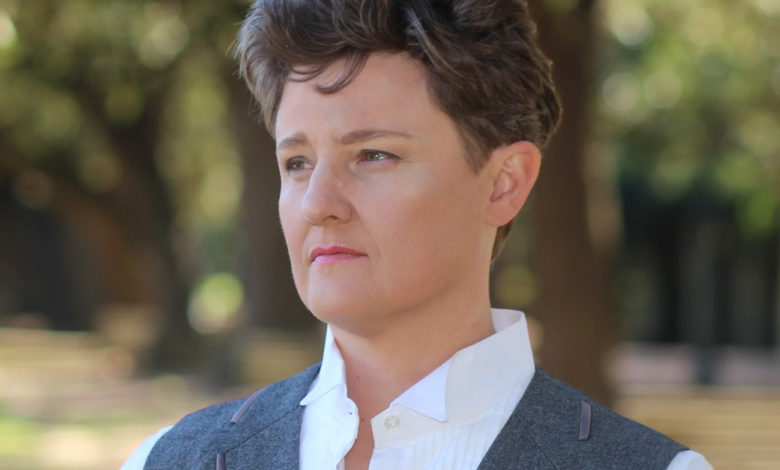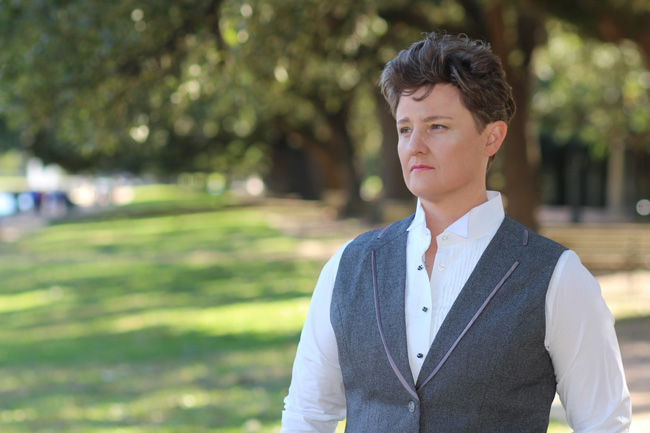
Healing Through Storytelling
Navy veteran Pacifica Sauer’s 2021 film reveals the traumatic violence faced by women in the military.

Production editor Pacifica J. Sauer, a three-time Emmy winner, uses her platform at KHOU-TV to give marginalized people the chance to tell their stories.
“Privileged people get to tell their stories all the time. The everyday people and the little-known middlemen, these are the people that we need to be telling stories of,” says Sauer, an out lesbian.
At KHOU, she oversees community programming, commercials, sales, documentaries, and more. She recently helped the station produce a documentary on Houston’s Pride parade and grand marshals, highlighting Space City’s contributions to the fight for LGBTQ rights.
Sauer has always loved storytelling. Growing up, she remembers pleading with the people in her life to tell her a story. “I just loved to hear stories. The way people told them, the way they changed their voices, how they went back to things and explained it—all of that was important to me,” she recalls.
And now, storytelling is helping her heal from a trauma she experienced while in the Navy. Her 2021 award-winning film, The Invisible Project, exposes the adversities women in the military face.
An Army brat, Sauer was raised around the world, from Alabama to Germany. She left high school to join the Navy at age 17, and she served for eight years, from 1996 to 2004. Recruiters promised her that she would discover herself, see the world, and receive the funds she needed for a better education. “It was true, but all that came at a personal price,” she says.
She was assaulted by her supervisor at age 19 and was later diagnosed with post-traumatic stress disorder, or PTSD.
“When you talk about your traumatic events, a lot of people talk about their ‘death date.’ That is the day of their incident. They mourn the loss of the person they were before all that, [but] I didn’t have all that,” she says. “I didn’t have an identity before the assault. I still don’t know who I am.”
Issued in 1993 and repealed in 2011, “Don’t Ask, Don’t Tell” shaped Sauer’s time in the Navy. That policy prohibited military personnel from discriminating against closeted
LGBTQ service members, but barred people who were out from military service. It negatively impacted the lives of many soldiers, especially women.
“As a woman in the military, especially if you’re enlisted, [according to the men] you’re either a ‘bitch’ or a ‘slut,’ and if you’re not sleeping with everybody, they kind of have it figured out,” she explains. “If you want things to be easy for you, you have to pretty much sell your body, and that’s unfortunate.”
Years later, Sauer still suffers from delusions, paranoia, and overwhelming anxiety. Before she was diagnosed, she would swear that pedestrians on the street were following her, and that colleagues were conspiring to ruin her projects. Sauer says her disorder made her unstable.
“When I first started having hard-core PTSD symptoms, I had no idea what this was,” she admits. “I thought I was having a psychotic breakdown.”
After her assault, she received an ROTC scholarship and attended a university in Vermont, but failed every course. She’s lost 20 jobs due to her illness, and she once had a fight with colleagues that ended with her slamming doors shut. She’s also lost many friends and loved ones over the years.
“PTSD ripped through my life; it ripped it to shreds. It ripped my family life apart, it ripped friendships apart, it ripped school apart. It was essentially a life sentence,” she admits.
One in three women and one in 50 men have experienced Military Sexual Trauma (MST), according to a report by the United States Department of Veterans Affairs.
Sauer wanted to highlight the struggles faced by women in the military, and she knew she could do that as a storyteller. As she pursued a career in animation, and later in production, her healing journey began.
“Being a production editor really helped fix a lot of the holes in me. Where I saw a lot of uncompleted things in my life, I could fill the holes with completed projects that changed minds, gave people ideas, and inspired humanity to do better.”
At KHOU, she was assigned several projects involving veterans. As she worked with people who had also experienced MST, she found much-needed camaraderie. After collaborating with and hearing the stories of many veterans, in 2021 she produced The Invisible Project, her own film about female military personnel and their struggles. KHOU aired the film on July 4, 2021.
Creating The Invisible Project forced her to confront her trauma and work toward healing. “You can live and die this way, or you can do something with it. I chose to do something, and that’s what became The Invisible Project.”
Sauer still wrestles with PTSD. Even while working on The Invisible Project, she suffered from delusions, fearing a colleague was plotting to upend her project after she received an email in all-capital letters.
But she now has a better grasp on her disease. She wants to kick-start more conversations on mental health and inspire more compassion for those suffering from mental illness. She works toward this goal as a storyteller with the help of her partner of 10 years, an elementary school principal.
When Sauer told her partner that she was an MST survivor, she worried that she would be thrown out of their house. But her partner embraced her, and the therapist they found is helping her to live in her truth.
Sauer and her partner now live with their three dogs, Peanut, Bella, and Lucy. “We work to educate people and to change minds,” she says.
She urges aspiring creatives to never give up. “Keep trying, and be nice to everybody—even the receptionists.”
To veterans suffering from MST, Sauer adds, “There’s the veteran’s club, and then there’s [the MST club that’s] not one you want to be a part of, but you find yourself in it. There’s more of us [there] than we care to admit, and when you start to really find out about people, you find out you’re not alone in your problems, and that MST is very common, and it’s OK. It’s OK.”
For more information on The Invisible Project, visit theinvisibleprojectfilm.com.
The 24-hour National Sexual Assault Hotline can be reached at 1-800-656-4673.The 24-hour Texas Military Department (TMD) Sexual Harassment/Assault Prevention and Response (SHARP/SAPR) survivor support line is 512-565-4410. For more information on TMDR and SHARP/SAPR, visit the tmd.texas.gov/tmd-sapr.
This article appears in the July 2022 edition of OutSmart magazine.











Comments